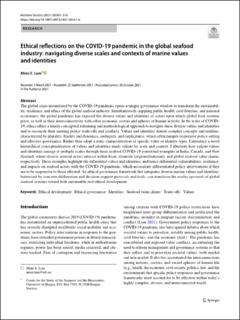| dc.description.abstract | The global crisis instantiated by the COVID-19 pandemic opens a unique governance window to transform the sustainability, resilience, and ethics of the global seafood industry. Simultaneously crippling public health, civil liberties, and national economies, the global pandemic has exposed the diverse values and identities of actors upon which global food systems pivot, as well as their interconnectivity with other economic sectors and spheres of human activity. In the wake of COVID-19, ethics offers a timely conceptual reframing and methodological approach to navigate these diverse values and identities and to reconcile their ensuing policy trade-offs and conflicts. Values and identities denote complex concepts and realities, characterized by plurality, fluidity and dynamics, ambiguity, and implicitness, which often hamper responsive policy-setting and effective governance. Rather than adopt a static characterization of specific value or identity types, I introduce a novel hierarchical conceptualization of values and identities made salient by scale and context. I illustrate how salient values and identities emerge at multiple scales through three seafood COVID-19 contextual examples in India, Canada, and New Zealand, where diverse seafood actors interact within local, domestic (regional/national), and global seafood value chains, respectively. These examples highlight the differential values and identities, and hence differential vulnerabilities, resilience, and impacts on seafood actors with the COVID-19 pandemic, which necessitate differentiated policy interventions if they are to be responsive to those affected. An ethical governance framework that integrates diverse marine values and identities, buttressed by concrete deliberation and decision-support protocols and tools, can transform the modus operandi of global seafood systems toward both sustainable and ethical development. | en_US |

